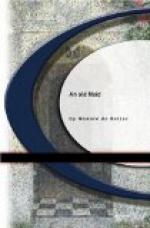The citizen du Bousquier was one of Barras’ familiars; he was on the best of terms with Fouche, stood very well with Bernadotte, and fully expected to become a minister by throwing himself into the party which secretly caballed against Bonaparte until Marengo. If it had not been for Kellermann’s charge and Desaix’s death, du Bousquier would probably have become a minister. He was one of the chief assistances of that secret government whom Napoleon’s luck send behind the scenes in 1793. (See “An Historical Mystery.”) The unexpected victory of Marengo was the defeat of that party who actually had their proclamations printed to return to the principles of the Montagne in case the First Consul succumbed.
Convinced of the impossibility of Bonaparte’s triumph, du Bousquier staked the greater part of his property on a fall in the Funds, and kept two couriers on the field of battle. The first started for Paris when Melas’ victory was certain; the second, starting four hours later, brought the news of the defeat of the Austrians. Du Bousquier cursed Kellermann and Desaix; he dared not curse Bonaparte, who might owe him millions. This alternative of millions to be earned and present ruin staring him in the face, deprived the purveyor of most of his faculties: he became nearly imbecile for several days; the man had so abused his health by excesses that when the thunderbolt fell upon him he had no strength to resist. The payment of his bills against the Exchequer gave him some hopes for the future, but, in spite of all efforts to ingratiate himself, Napoleon’s hatred to the contractors who had speculated on his defeat made itself felt; du Bousquier was left without a sou. The immorality of his private life, his intimacy with Barras and Bernadotte, displeased the First Consul even more than his manoeuvres at the Bourse, and he struck du Bousquier’s name from the list of the government contractors.
Out of all his past opulence du Bousquier saved only twelve hundred francs a year from an investment in the Grand Livre, which he had happened to place there by pure caprice, and which saved him from penury. A man ruined by the First Consul interested the town of Alencon, to which he now returned, where royalism was secretly dominant. Du Bousquier, furious against Bonaparte, relating stories against him of his meanness, of Josephine’s improprieties, and all the other scandalous anecdotes of the last ten years, was well received.
About this time, when he was somewhere between forty and fifty, du Bousquier’s appearance was that of a bachelor of thirty-six, of medium height, plump as a purveyor, proud of his vigorous calves, with a strongly marked countenance, a flattened nose, the nostrils garnished with hair, black eyes with thick lashes, from which darted shrewd glances like those of Monsieur de Talleyrand, though somewhat dulled. He still wore republican whiskers and his hair very long; his hands, adorned with bunches of hair on each




